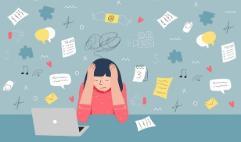Looking after your mental wellbeing
 Looking after your Mental Wellbeing
Looking after your Mental Wellbeing
Mental and physical wellbeing are often neglected unintentionally when it comes to studying for exams. Stress, anxiety, and worry take over resulting in endless hours being spent at the laptop studying. This is a common situation around exam season but due to the current pandemic, screen time has increased as a result of working from home. This article will provide some tips and advice on how to deal with stress and anxiety around exams. To read more about how to maintain mental wellbeing all year round, a link is provided at the end of this article.
First off, what is Anxiety and Stress?
Anxiety is a common feeling that everyone experiences as an emotional response to stressful situations. Feelings include worry and tension as responses to potential stressful scenarios. Sample situations could be: sitting an exam, driving or social gatherings.
sitting an exam, driving or social gatherings.
Stress is our body’s response to pressure. It is any change that causes physical, emotional, and psychological strain. It is triggered when we feel like we have lost control over a situation and deflates our sense of self! Situations where you might experience stress include studying for exams, assignment deadlines or starting a new job.
The New College Experience- Remote Learning:
College remotely is completely different to college on campus. Normal college routines have been disrupted leading to having no set routine, resulting in feelings of guilt, regret and feeling a day has been wasted.
Here are some tips on how to get back a sense of normality:
Walking around the college: Lectures on campus consisted of moving from one room to another, meaning small amounts of movement in-between classes. When a zoom call ends for one of your modules, go for a walk around the house or outside for the two-, three- or five-minute walk you normally did to get to your next lecture!
small amounts of movement in-between classes. When a zoom call ends for one of your modules, go for a walk around the house or outside for the two-, three- or five-minute walk you normally did to get to your next lecture!
Studying with friends: Organise group zoom/facetime calls with your friend while studying in the evening time. This will mimic the routine of going to the library with them to study. Even facetime at lunch time for a catch up to mimic the routine of eating lunch together when you were back on campus!
Social Interactions: Lectures on campus include a lot of social interactions. While waiting for a lecture to begin, normally everyone would be chatting. If possible, log onto your next online lecture early and speak to your friends before it begins. Ask the lecturer to turn off the waiting room to make this possible! Chatting to your friends will put you in a good mood before the lecture begins!
Morning Routine: Does waking up 5 minutes before a 9am lecture sound familiar? If you used to be an early riser because you had to walk 20 minutes to the college campus, do the same routine at home! Get up early, get dressed, sort yourself for the day and go for that 20-minute walk to mimic your old morning routine! This will get you in the right mindset to tackle a day of online lectures!
Study tips:
Studying for exams can be overwhelming, exhausting and stressful. If it gets too much, there are ways to help keep calm:
keep calm:
1. Keep a routine and regular breaks: Write out an achievable ‘to do’ list for each day, by writing things down it takes away unnecessary strain from the mind. Taking breaks are essential to rest and clear the mind resulting in improved concentration! Remember, after each hour of studying, take a 5-minute break!
2. Limit caffeine intake: Caffeine and energy drinks give short term boosts of energy to increase concentration but are not good in the long-term resulting in poor sleep quality. Increase water intake to keep hydrated!
3. Look after yourself: It’s easy to forget about yourself and your mental health when studying. Try to get a good sleep, take time to do something for yourself, whether it is doing your skin care routine or playing a game you love. Do something for you!
4. Know what works for you: Everyone has a different way of studying, find a way that is most effective for you. For example: watching videos, creating mind maps, writing notes, or reading lecture notes.
5. Leave the stress in the exam hall: Don’t take it home with you, remember that all you can do is your best. When doing exams online, leave your room/study space for a while to wind down after the exam, come back later refreshed to prepare for the next exam!
6. Ask for and accept support: Talk to your friends or family, they will help you if you are in need. It’s okay not to be okay.
A Mental Wellbeing seminar is also available here on the website, where UCD Student Counsellor Donal Kiernan discusses exam stress. This seminar is worth a watch if you are feeling anxious about exams!!

Healthy Eating tips:
You might tend to throw your eating habits out the window around exam time, grabbing anything at hand to save time from cooking. Healthy eating plays a role in exam performance by improving concentration and providing energy to study:
providing energy to study:
1. Don’t skip breakfast: The brain uses up to 20% of the energy we need every day. Breakfast is essential in giving the brain the energy we need to start the day as well as nutrients for the body! Breakfast provides energy after a period of no food resulting in improved concentration levels.
2. Keep Hydrated: Aim to drink 1.5 to 2L of fluids per day. Dehydration can make you feel irritable and tired, it also affects your concentration. Keep a glass of fluid (water, herbal tea, etc.) at your desk while studying.
3. Your time is precious: Make a batch of healthy homemade meals that can be frozen in individual portions! For example- Spaghetti Bolognese, Chilli Con Carne or Shepherd’s Pie. This results in time being saved and no dishes! If you would like some inspiration for bulk cooking, here are some recipe videos for cooking on a budget!
4. Smart snacking: Snacks like fruit, popcorn, yoghurts, or nuts will provide energy throughout the day. Cakes, sweets, and chocolate are high in sugar resulting in a small sugar rush, leading to you feeling flat. Keeping a steady supply of energy throughout the day will ensure you don’t lose concentration. Bring a healthy snack to eat before or during exam to maintain concentration levels.
For more information about what types of food you should eat during exam time to maximise your exam performance, take a look at Amy Meegan’s article ‘Eating Well During Exam time’
A Healthy Eating Seminar is also available here on the Healthy UCD website. Registered dietitian Aislinn McCourt discusses the importance of a healthy diet and healthy snack ideas! This is well worth a watch to get some great advice!!

Mental Health is important and should not be neglected. If you are struggling with exam stress, have lost interest in things you love or don’t feel like yourself, remember things will be ok. Speaking about how you feel isn’t a sign of weakness, coming forward and asking for help takes courage. It shows strength!
how you feel isn’t a sign of weakness, coming forward and asking for help takes courage. It shows strength!
To read more about how to maintain mental wellbeing all year round, click here!